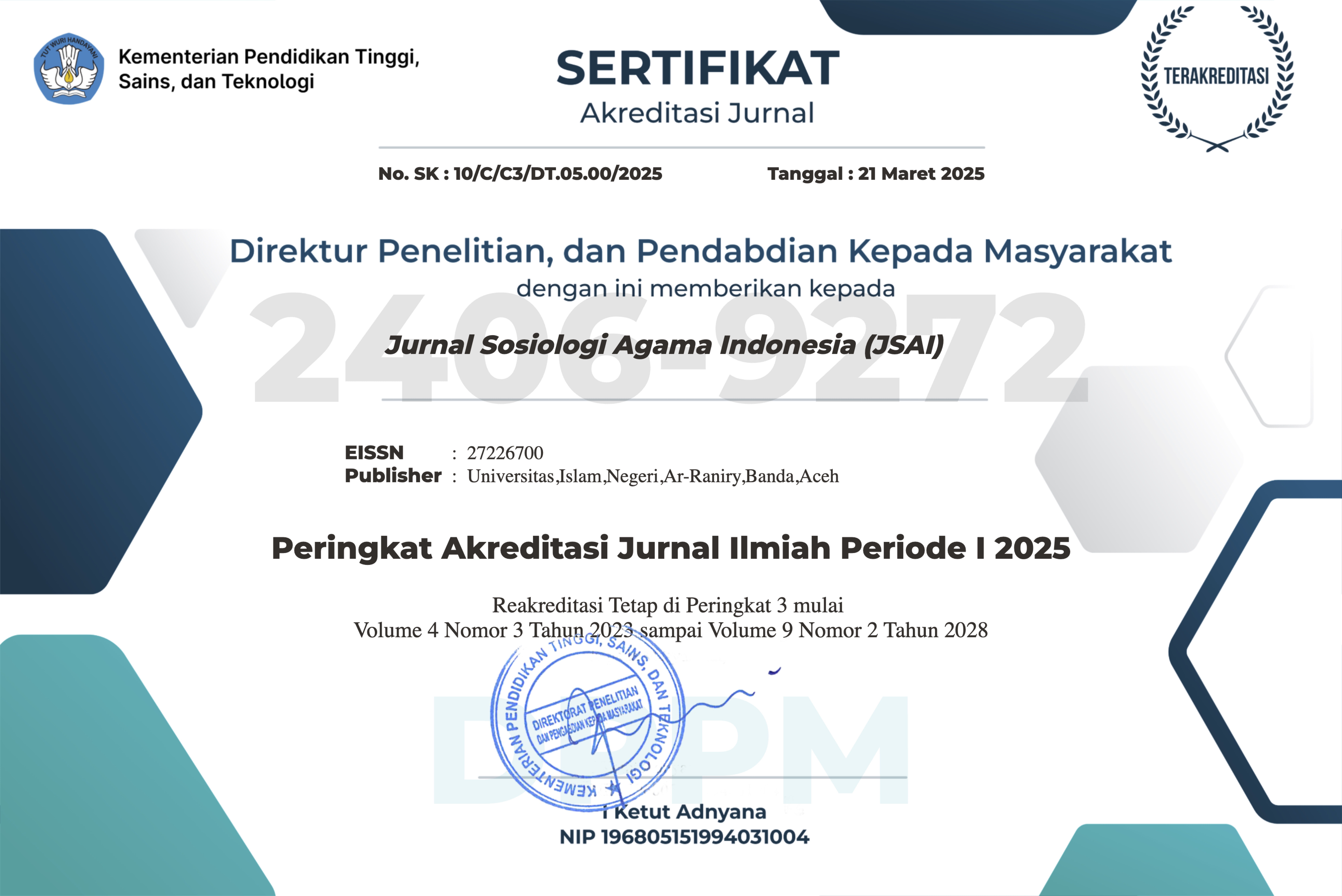Psychospiritual and Socioreligious Approaches to Mental Health in Islam and Christianity
DOI:
https://doi.org/10.22373/jsai.v6i1.7673Keywords:
Mental Health, Religious Coping, Spirituality, Islam, Christianity, Psychospirituality, Socioreligious FrameworkAbstract
Mental health is a multidimensional aspect of human well-being, encompassing emotional, psychological, social, and spiritual components. In religiously devout societies such as Indonesia, spiritual and communal values deeply influence how mental health is perceived and addressed. This study explores psychospiritual and socioreligious approaches to mental health by comparing Islamic and Christian perspectives. Through a qualitative-descriptive method and library-based research, the study draws upon classical theological texts, scriptural sources, and contemporary literature to analyze religious coping mechanisms, core spiritual values, and their integration into mental well-being. Findings reveal that Islam emphasizes al-nafs al-muṭma’innah (the tranquil soul), achieved through tazkiyat al-nafs (self-purification), devotion, and social responsibility. Christianity, meanwhile, centers on shalom (divine peace), fostered through personal relationship with God, hope, and communal worship. Both traditions offer distinct but complementary coping strategies that connect inner resilience with faith-based practices and collective religious life. By situating mental health within theological and sociocultural frameworks, this study contributes to the development of integrative models that bridge psychological care, spiritual meaning, and community-based support—particularly in multireligious and culturally rooted contexts.
References
A.F. Jaelani. 2000. Penyucian Jiwa (Tazkiyat Al-Nafs) & Kesehatan Mental. Jakarta: Perbitan Amzah.
Alfain, Shinta Nuriya Idatul, Achmad Khudori Soleh, and Muhammad Rafi Yamani. 2023. “The Role of Patience in Coping Mental Problems: A Quranic Perspective.” Tribakti: Jurnal Pemikiran Keislaman 34(2):195–212. doi: 10.33367/tribakti.v34i2.3633.
Anwar, Faisal, and Putry Julia. 2021. “Analisis Strategi Pembinaan Kesehatan Mental Oleh Guru Pengasuh Sekolah Berasrama Di Aceh Besar Pada Masa Pandemi.” Jurnal Edukasi: Jurnal Bimbingan Konseling 7(1):64–83. doi: 10.22373/je.v7i1.10905.
Awaad, Rania, and Sara Ali. 2016. “A Modern Conceptualization of Phobia in Al-Balkhi’s 9th Century Treatise: Sustenance of the Body and Soul.” Journal of Anxiety Disorders 37:89–93. doi: 10.1016/j.janxdis.2015.11.003.
Burlian, Paisol. 2016. “KONSEP AL-NAFS DALAM KAJIAN TASAWUF AL-GHAZᾹLĪ.” Jurnal THEOLOGIA 24(2):223–46. doi: 10.21580/teo.2013.24.2.334.
Callender-Carter, Sylvia T., and Ikechukwu Michael Oluikpe. 2016. “Shalom as Wholeness: A Biblical Basis for Meeting Global Health Needs in the 21st Century.” International Forum Journal 19(2):97. doi: 10.63201/JCSX3547.
Carona, Carlos, and Ana Fonseca. 2021. “The Clinical Utility of the Concept of Mental Hygiene in the Behavioral Treatment of Depression.” Clínica y Salud 32(3):147–49. doi: 10.5093/clysa2021a8.
Creswell, J. W. 2018. Research and Design Qualitative, Quantitative and Mixed Methods Approaches.
Dewi, Kartika Sari. 2012. Buku Ajar Kesehatan Mental. Semarang: LPPM Universitas Diponegoro.
Faizah, Misbahul, and Syamsul Arifin. 2023. “Konsep Tawakal Dalam Al-Qur’an Dan Relevansinya Terhadap Pendidikan.” PUTIH: Jurnal Pengetahuan Tentang Ilmu Dan Hikmah 8(2):1–14. doi: 10.51498/1met6p11.
Fajrussalam, Hisny, Isma Aulia Hasanah, Niken Oktavia Anisa Asri, and Nur Adilla Anaureta. 2022. “Peran Agama Islam Dalam Pengaruh Kesehatan Mental Mahasiswa.” Al-Fikri: Jurnal Studi Dan Penelitian Pendidikan Islam 5(1):22. doi: 10.30659/jspi.v5i1.21041.
Hafidz Khusnadin, Muhammad, and Muhammad Fahmi Shihab. 2025. “Al-Ghazali’s Concept of Tazkiyatun Nafs as a Method in Moral Education.” Oasis : Jurnal Ilmiah Kajian Islam 9(2):151. doi: 10.24235/oasis.v9i2.19732.
Hanurawan, Fattah. 2012. “Strategi Pengembangan Kesehatan Mental Di Lingkungan Sekolah.” PSIKOPEDAGOGIA Jurnal Bimbingan Dan Konseling 1(1). doi: 10.12928/psikopedagogia.v1i1.2572.
Hasneli, Hasneli. 2014. Kesehatan Mental Dalam Pandangan Islam. Haifa Press.
Huda, Miftachul, Ajat Sudrajat, Razaleigh Muhamat, Kamarul Shukri Mat Teh, and Burhanuddin Jalal. 2019. “Strengthening Divine Values for Self-Regulation in Religiosity: Insights from Tawakkul (Trust in God).” International Journal of Ethics and Systems IJOES-02-2018-0025. doi: 10.1108/IJOES-02-2018-0025.
Iwański, Dariusz, and Thomas G. Plante. 2025. “Potential Mental Disorder Symptoms in the Prophet Elijah: An Exegetical and Psychological Analysis of Selected Episodes from 1 Kings 18–19.” Journal of Religion and Health. doi: 10.1007/s10943-025-02274-x.
Lewis Hall, M. Elizabeth, and Peter Hill. 2019. “Meaning-Making, Suffering, and Religion: A Worldview Conception.” Mental Health, Religion & Culture 22(5):467–79. doi: 10.1080/13674676.2019.1625037.
Lloyd, Christopher E. M., Joshua Cathcart, Maxinne C. Panagopoulos, and Graham Reid. 2024. “The Experiences of Faith and Church Community among Christian Adults with Mental Illness: A Qualitative Metasynthesis.” Psychology of Religion and Spirituality 16(4):352–66. doi: 10.1037/rel0000511.
Lubis, Layla Takhfa, Laras Sati, Naura Najla Adhinda, Hera Yulianirta, and Bahril Hidayat. 2019. “Peningkatan Kesehatan Mental Anak Dan Remaja Melalui Ibadah Keislaman.” Al-Hikmah: Jurnal Agama Dan Ilmu Pengetahuan 16(2):120–29. doi: 10.25299/jaip.2019.vol16(2).3898.
Mijatović, Franjo. 2021. “(In)Active God—Coping with Suffering and Pain from the Perspective of Christianity.” Religions 12(11):939. doi: 10.3390/rel12110939.
Pargament, K. I. 2001. The Psychology of Religion and Coping: Theory, Research, Practice. Guilford Publications.
Saeed, Sarhang I., Jaafar O. Ahmed, Karwan Kakamad, and Zana Najmadden. 2024. “Abu Zayd Ahmed Ibn Sahl Al-Balkhi (850-934): A Pioneer in the Field of Psychotherapy and Mental Health.” Cureus. doi: 10.7759/cureus.67998.
Sanjari, Jani, and Pratiwi Nurlita. 2023. “KONSEP KESEHATAN MENTAL PERSPEKTIF IMAM AL-GHAZALI DALAM KITAB IHYA ULUMUDDIN.” HASBUNA : Jurnal Pendidikan Islam 3(1):225–41. doi: 10.70143/hasbuna.v3i1.222.
Sanou, Boubakar. 2024. “Shalom: Health, Healing, and Wholeness in Biblical Perspective.” Journal of Adventist Mission Studies 20(1):30–45. doi: 10.32597/1553-9881.1554.
Solomon, Robert. 1999. “Biblical Perspectives on Mental Health Care.” International Review of Mission 88(350):226–39. doi: 10.1111/j.1758-6631.1999.tb00153.x.
Sugiyono. 2017. Metode Penelitian Kebijakan: Pendekatan Kuantitatif, Kualitatif, Kombinasi, R&D Dan Penelitian Evaluasi. edited by S. Y. Ratri. Bandung: Alfabeta.
Tamrin, Abu. 2018. “Manusia Berbasis Al-Quran Dalam Dimensi Filsafat Ilmu.” SALAM: Jurnal Sosial Dan Budaya Syar-I 5(3):219–40. doi: 10.15408/sjsbs.v5i3.10298.
Taufik, Taufik. 2020. Psikologi Agama. Mataram. edited by M. Fakhri. Sinabil Creative.
Timbers, Veronica L., and Jennifer C. Hollenberger. 2022. “Christian Mindfulness and Mental Health: Coping through Sacred Traditions and Embodied Awareness.” Religions 13(1):62. doi: 10.3390/rel13010062.
Welan, Delaxita, Christine Wangean, and Juwinner Kasingku. 2023. “Integrasi Pendidikan Rohani: Pengaruh Membaca Firman Terhadap Kesehatan Mental.” Journal on Education: 6(1):7858–67. doi: 10.31004/joe.v6i1.4189.
WHO. 2022. “Mental Health.” Retrieved (https://www.who.int/news-room/fact-sheets/detail/mental-health-strengthening-our-response).
Yahya, Norhashimah, Syed Hadzrullathfi Syed Omar, Siti Hajar Mohamad Yusoff, Mohd Hasrul Shuhari Shuhari, and Muhammad Hafizi Rozali. 2020. “Element of Happiness by Al Ghazali and Relation in Islamic Psychospiritual.” International Journal of Academic Research in Business and Social Sciences 10(11). doi: 10.6007/IJARBSS/v10-i11/8202.
Yusuf, Syamsu. 2021. Kesehatan Mental Perespektif Psikologis Dan Agama. PT Remaja Rosdakarya.
Downloads
Published
How to Cite
Issue
Section
License
Copyright (c) 2025 Nur Helmelia Putri, Arifinsyah Arifinsyah

This work is licensed under a Creative Commons Attribution-NonCommercial-ShareAlike 4.0 International License.
- Authors retain copyright and grant the journal right of first publication with the work simultaneously licensed under an Attribution-NonCommercial-ShareAlike 4.0 International (CC BY-NC-SA 4.0) that allows others to share the work with an acknowledgment of the work's authorship and initial publication in this journal.
- Authors are able to enter into separate, additional contractual arrangements for the non-exclusive distribution of the journal's published version of the work (e.g., post it to an institutional repository or publish it in a book), with an acknowledgment of its initial publication in this journal.
- Authors are permitted and encouraged to post their work online (e.g., in institutional repositories or on their website) prior to and during the submission process, as it can lead to productive exchanges, as well as earlier and greater citation of published work.
















